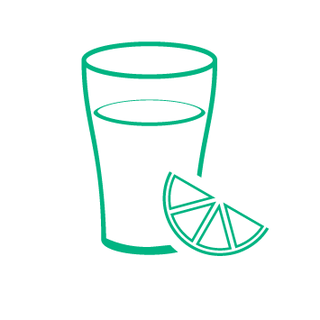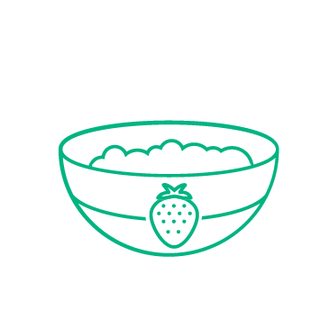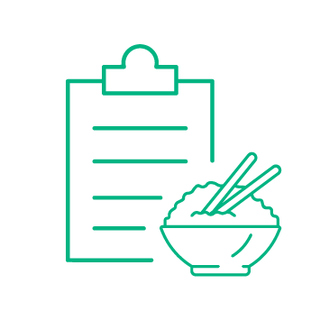Eat what’s good for you - the right ostomy diet*
With a stoma, good nutrition becomes more essential than ever. Why? Because your bowel has less capacity to absorb food as well as it did before part of it was removed.
So now is the time to rethink your eating habits and modify your diet.
First and foremost, eating will probably not be a topic on your agenda directly after surgery as most people need some time to find their appetite again. This makes it all the more important to start with a healthy diet.
Three weeks following your stoma surgery
Move one step at a time
In the first three weeks after your operation, you should follow a specific diet to ensure the best recovery possible. This diet will also remove certain categories of food and drink that irritate the intestines and may slow down the healing process and cause digestive tract issues.
For a little while, it is a good idea to cut down on raw fruit and vegetables, wholegrain and dairy products as well as on everything that bloats. Drinks that irritate the intestines such as tea, sparkling water and sodas are off the list for now as they increase inflammation.
A plan for your diet
Everybody is different, so it is best to talk this diet sheet over with your physician. They can tell you when to move on to each step. But remember, in the end it is your feeling which counts.

Step 1
For the first few days after surgery, you should stick to mild coffee, lemon water and water with syrup.

Step 2
After approximately three to five days – trust your own feeling or ask your nutritional consultant – you can add pureed cooked fruit to the mild coffee, lemon water and water with syrup.

Step 3
When you feel ready, you can start to eat half a portion of blended food. Use starchy ingredients and proteins. Continue to avoid food that may be irritable (next section) and vegetables.
Step 4
Little by little, at your own pace, you can increase quantities and move on to more solid food.

Step 5
You have made it! Now you can eat quite normally, though it should remain a healthy diet.
Starting the 4th week after surgery
In the fourth week after your surgery, the main goal is to adapt and keep to your diet as to maintain frequency, consistency and amount of stool. You might not go back completely to what you were eating before your surgery. However, your new eating habits can help to avoid malnutrition, and with a well-balanced diet you will obtain all necessary vitamins, minerals and calories needed for good recovery.
General tips:
- Add one new food at a time to your diet and observe its potential side effects.
- Eat at regular intervals. Skipping meals increases the incidence of stools and gas.
- Chew your food thoroughly.
Food to avoid with a stoma
Forbidden or allowed? Good food for you
Our specialist* has put together some important and helpful information for you. Among the top tips is this piece of advice: Eat starchy food as this is very well absorbed and brings you maximum energy for your daily needs.
Starchy products from whole wheat?
Whole wheat products seem healthier than modified food. Not at all, it will cause more gas and more problems with the stoma output, because it contains the outer layers of the cereal which does not dissolve and is extremely fermentable. So, avoid starchy products from whole cereals.
Good starches for you are
- light bread, possibly without whole wheat
- potatoes
- non whole wheat cereals, rice, pasta, quinoa, bulgur, semolina.
Food to be avoided with a stoma
Even though starches are recommended, some aren’t helpful at this point. These are:
- corn
- whole wheat bread
- whole wheat cereals
- pulses (chickpeas, lentils, peas, beans)
Raw or cooked vegetables or fruits?
Better choose cooked vegetables or fruits as they are easily digested. Raw vegetables and fruits will ferment much more and cause a lot of gas and sometimes appliance issues.
Coffee or tea?
You love coffee? Good for you, because coffee is preferable to tea (including herbal tea), which irritates the intestine and therefore increases the stoma output and causes intestinal pain.
Sparkling or still water?
Still water is the better choice. The carbon dioxide in the sparkling water will react with the hydrochloric acid secreted in the stomach and forms a compound called carbonic acid that irritates the intestinal mucosa.
An appropriate diet can change your life
We have created different well-balanced diets for the different types of ostomy, so choose the suitable one for you below. Feel free to download them.
Choose the suitable guide for you
The importance of nutrition for ostomates
The importance of nutrition for ostomates
-
Partnership with Dr Philippe Fauqué
We have teamed up with a specialist to offer you valuable guidelines to adapt your eating habits. Dr. Philippe Fauqué is a dietician physician specialized in nutrition. He leads the renowned clinical nutrition unit at the Institute Polyclinique of Cannes where people with various digestive pathologies are treated. Find here a short interview with him.
-
Discover the story of Marek Lichota
Marek Lichota a former ostomate encountered us his story regarding the different nutritional issues that he had to face during his hospital stay after his stoma surgery. Discover his main diet recommendations to people having an ostomy.
-
Note:
*We have teamed up with a specialist to offer you valuable guidelines to adapt your eating habits. Dr. Philippe Fauqué is a dietician physician specialized in nutrition. He leads the renowned Clinical Nutrition Unit at the Institute Polyclinique of Cannes where people with various digestive pathologies are treated.
General note:
The image is used for illustration purposes only and any person portrayed is a model.












